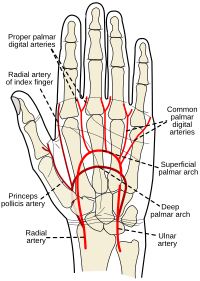
Photo from wikipedia
Background: Adequate procedural anticoagulation is crucial for radial artery occlusion (RAO) prevention in patients undergoing transradial access coronary catheterization, although the effect of postprocedural anticoagulation lack thorough investigation. The aim… Click to show full abstract
Background: Adequate procedural anticoagulation is crucial for radial artery occlusion (RAO) prevention in patients undergoing transradial access coronary catheterization, although the effect of postprocedural anticoagulation lack thorough investigation. The aim of this study was to evaluate the clinical value of short-term postoperative anticoagulation with rivaroxaban for 24 hours and 1-month RAO prevention in patients who received transradial coronary procedures. Methods: A total of 382 patients were randomized to receive either placebo (control group) or rivaroxaban 10 mg once daily for a period of 7 days (rivaroxaban group) to evaluate the effect of the rivaroxaban in the prevention of 24 hours and 1-month RAO assessed by Doppler ultrasound. Results: There was no significant difference in the incidence of 24-hour RAO (8.9% versus 11.5%; P=0.398) between the rivaroxaban group and control group (odds ratio, 0.75 [95% CI, 0.39–1.46]; P=0.399). In contrast, the 1-month RAO (3.8% versus 11.5%; P=0.011) was significantly reduced in patients who received rivaroxaban as compared with those who did placebo (odds ratio, 0.22 [95% CI, 0.08–0.65]; P=0.006). For patients with 24-hour RAO, the rivaroxaban group was associated with higher recanalization rate of the radial artery (69.2% versus 30.0%; P=0.027) compared with the control group. No significant differences can be observed between the 2 groups for access-site complications or bleeding events. Conclusions: Short-term postoperative anticoagulation with rivaroxaban did not reduce the rate of 24-hour RAO but improved 1-month RAO, because of higher recanalization of the radial artery. However, larger clinical trials are needed to prove our results. Registration: URL: https://www.chictr.org.cn; Unique identifier: ChiCTR1900026974.
Journal Title: Circulation: Cardiovascular Interventions
Year Published: 2022
Link to full text (if available)
Share on Social Media: Sign Up to like & get
recommendations!